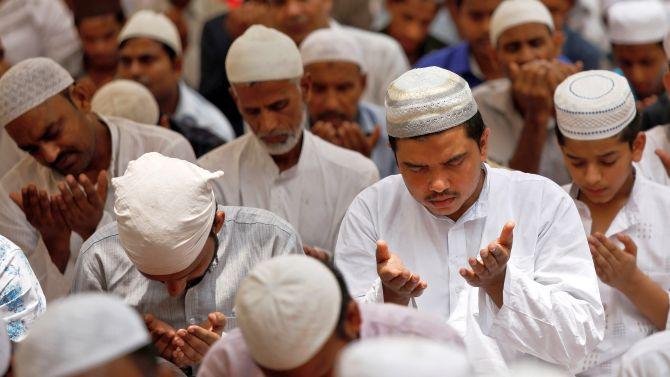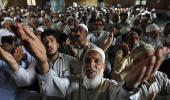Rahul Gandhi has not erred by not engaging with Muslim conservatives.
After all, they had misled his father in 1986 to legislate a misogynistic law after the Supreme Court verdict in the Shah Bano case, which helped the BJP rise at the cost of the Congress, says Mohammad Sajjad.

Rahul Gandhi's outreach event with some members of the Muslim intelligentsia has invited mixed reactions.
Besides the unpalatably harsh and alarmingly worrisome remarks from Defence Minister Nirmala Sitharaman, a significant omission on Rahul's part is that Muslims identified as conservatives were conspicuous by their absence at his event.
This is in sharp contrast with what his father Rajiv Gandhi did in the latter half of the 1980s.
Does it foretell that Rahul appears to be learning from his father's mistakes?
At least theoretically, during Rajiv's stint, those were deviations from the Congress's stated ideals.
That Rahul didn't have any Pasmanda intellectual-activist at his meeting is an indication that he and his advisors have to learn some more.
The absence of women's rights activists was equally disappointing.
Only last month, Rahul Gandhi is said to have delivered a stirring speech at the national convention of the Congress's OBC wing, committing to reach out to them by offering a greater share of political power.
Does it indicate that the Congress's minority cell, headed by Nadeem Javed, has not done adequate homework on issues of caste and gender among Muslims?
Javed must realise that Pasmanda voices have been getting louder since the 1990s, both in terms of the Arzal segment of Muslims pitching for inclusion in the scheduled castes, and and the rising demand for gender justice among Muslims.
A highly informed senior journalist and author on Congress affairs, Rasheed Kidwai, has pointed out that 'Purely in terms of electoral strategy, Rahul's initiative lacked clarity and a sense of purpose ahead of 2019', because 'deletion of clergy and those with deep roots in society is inexplicable'.
This remark warrants two queries:
a. Did courting this segment help Rajiv in the 1980s, or did it actually spell the Congress's doom in and after 1989?
b. In the current political scenario of bipolar politics, do the Muslim clergy, or for that matter other Indians wishing to get rid of the current dispensation, have any other option other than siding with the Congress-led coalition for the Lok Sabha elections?
Thus, Rahul has not erred by not engaging with Muslim conservatives.
After all, they had misled Rajiv in 1986 to legislate a misogynistic law after the Supreme Court verdict in the Shah Bano case, which helped the BJP rise at the cost of the Congress.
This wilful exercise in misleading Rajiv is almost admitted to by the tallest of the clergy of the time, Maulana Syed Abul Hasan Ali Miyan Nadvi (1914-1999), in his Urdu memoir, Kaarwaan-e-Zindagi (1988), volume three, chapter four, pages 134, 157.
He clearly writes: 'Tahaffuz-e-shariat 1986 ki muhim ka nateeja yeh hua ki yeh mas’ela (qaziya-e-Babri Masjid) pecheedgi ekhtiyar karta gaya, is ne fiza mein ishte’aal aur izteraab paida karney mein bada hissa liya (The shariat protection campaign 1986 resulted in complicating the Babri Masjid dispute even more, and it also contributed to vitiating the communal atmosphere very badly).'
He further elaborates (page 134), quite triumphantly, on how he misled Rajiv Gandhi into not going by the examples of many Islamic countries where instant triple divorce has been disbanded and criminalised.
This is further corroborated by Rajiv Gandhi's biographer Nicholas Nugent: '...A decision had been taken by the Congress high command in the early 1986 to 'play the Hindu card' in the same way that the Muslim women's bill had been an attempt to 'play the Muslim card'.
'...Ayodhya was supposed to be a package deal.... a tit for tat for the Muslim Women's bill. ...Rajiv played a key role in carrying out the Hindu side of the package deal by such actions as arranging that pictures of Hindus worshipping at the newly unlocked shrine be shown on television'.
The point should be very clear to all forces of secularism that any attempt at communal politics by any party will eventually help only the BJP.
The Delhi-based historian S Irfan Habib (not to be confused with the Aligarh-based Marxist historian of the same name) is reported to have made the pertinent point that 'the Congress should raise issues which are of concern to all the people of India and not just Muslims....'
'[it] should talk about policies, employment, the atmosphere of fear and insecurity in which the people are living in... not only the Muslims, Dalits too are facing similar problems'.
Such sincere advice may not come from the clergy associated with the All India Muslim Personal Law Board.
Many of them are doing exactly those things which would be helpful to the BJP. Their stance on the un-Quranic instant triple divorce (talaq-e-biddat), and the timing of demanding Darul Qaza, or Sharia courts, without necessary media management and without clear-cut articulation to dispel misgivings over it, are just a few instances.
The Deen Bachao (save the faith) rally organised by the AIMPLB general secretary on April 15 in Patna ended with one of his protégés being nominated to the Bihar legislative council by the BJP's ally, Nitish Kumar.
That the intelligentsia at Rahul's meeting did not include academics from the Aligarh Muslim University is interesting.
In recent decades, AMU has not played the role of change agent in modernising Muslims.
Despite having huge departments of studies (in law, theology, comparative religion, Islamic studies, and social sciences), hardly any voice against conservatism has emerged from its campus.
Of the serving academics, barring one or two, hardly any voice has been raised against the clergy's intransigence in perpetuating regressively misogynist practices.
Since 1986, this university has not helped India's Muslims much in this direction, at least not adequately.
Though one of the progressive voices on the Shah Bano issue was of Arif Mohammed Khan, an AMU alumnus and former president of the AMU Students Union, he eventually suffered political diversions and oblivion.
To the best of my knowledge, not much research output has emanated from AMU on issues of caste and gender-based justice among the Muslims.
This should be a moment of deep introspection for the AMU community, as to how much did it do to fight conservatism among India's Muslims.
Compared to it, on emotive issues, the campus does succeed often in doing a little more in mobilising people to agitate and protest.
Thus, contrary to some shades of opinion, Rahul Gandhi appears to have grown a little wiser in excluding the Muslim conservatives.
However, his party needs to work harder in reaching out to the masses, and to raise an army of committed cadres for the next election, besides finding coalition partners.
The Congress must reorient its economic, education and employment policies and state with utmost stridency that it will stand for the poor and the middle classes.
Mohammad Sajjad is a Professor at the Centre of Advanced Study in History, Aligarh Muslim University.










